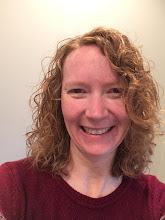I'm one of those weird writers who doesn't have a bajillion ideas that I'm trying to narrow down to a single workable one. Instead I usually have one idea that I force into a workable one because I have nothing else to choose from, and then when I'm finished with that one, I don't know what else to do.
But I'm getting better at hearing the suggestions of my Muse.
Since I went to LTUE in February, I've been experimenting with a few things, and I've found my inspiration has come more readily since. So here's what I've learned works for me and my Muse:
But I'm getting better at hearing the suggestions of my Muse.
Since I went to LTUE in February, I've been experimenting with a few things, and I've found my inspiration has come more readily since. So here's what I've learned works for me and my Muse:
- Let your Muse know you are open for business. Contrary to popular belief, inspiration doesn't just "happen." I've found I have to actively look for ideas, or at least be openly receptive to them, before they start to flow.
- Acknowledge your Muse's advice. Big and small ideas come to me fairly regularly now, but if I don't write them down, they leave just as easily. I have a "seedbook" of ideas where I store those thoughts. Then I can always go back and review them. Also, research shows that even just the act of writing things down helps you remember them better.
- Stroke your Muses's ego. Sometimes you have to record the small ideas that may (or may not) be no more than a line or phrase in a future story someday before your Muse will grace you with bigger ideas.
- Your Muse doesn't sleep, so why should you? Many of my best stories come from dreams that I have. Often I have to re-work the stories into a sensical (not necessarily logical) plot line, but those stories usually have the most potential, too. For me, that's where my full novels have originated from.
- Piggyback on your Muse's other clients. Ever read something and thought, "I don't like that ending" or "Why didn't he write it this way?" If so, go write it yourself. Or even the small passing comments or descriptions in a story can spark a completely unrelated idea. For example, I read a horror story that was set in a hundred-year-old, broken-down royal spa. The setting itself didn't have much to do with the specific plot or direction of the story, but it struck a chord in me. Now I'm writing a 30-page short story that has a working title of "Soul-Sucking Spa." Intrigued? (On a side note, titles can be a great source of inspiration for your own story, particularly if you are unfamiliar with the original work.)
Try new things, explore yourself and your writing. Be open to letting your Muse dictate how she wants to share your relationship. You'll be much happier and feel much more fulfilled if you do.

Comments
Post a Comment